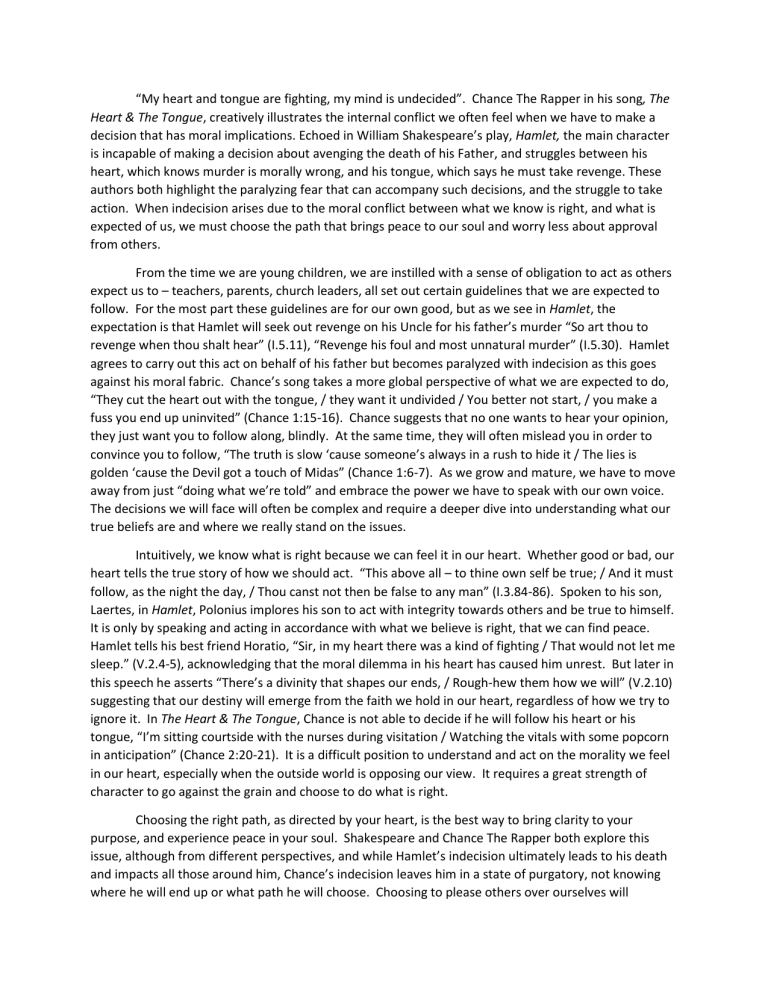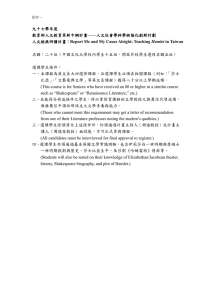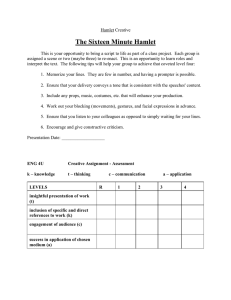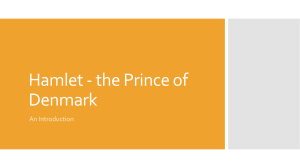
“My heart and tongue are fighting, my mind is undecided”. Chance The Rapper in his song, The Heart & The Tongue, creatively illustrates the internal conflict we often feel when we have to make a decision that has moral implications. Echoed in William Shakespeare’s play, Hamlet, the main character is incapable of making a decision about avenging the death of his Father, and struggles between his heart, which knows murder is morally wrong, and his tongue, which says he must take revenge. These authors both highlight the paralyzing fear that can accompany such decisions, and the struggle to take action. When indecision arises due to the moral conflict between what we know is right, and what is expected of us, we must choose the path that brings peace to our soul and worry less about approval from others. From the time we are young children, we are instilled with a sense of obligation to act as others expect us to – teachers, parents, church leaders, all set out certain guidelines that we are expected to follow. For the most part these guidelines are for our own good, but as we see in Hamlet, the expectation is that Hamlet will seek out revenge on his Uncle for his father’s murder “So art thou to revenge when thou shalt hear” (I.5.11), “Revenge his foul and most unnatural murder” (I.5.30). Hamlet agrees to carry out this act on behalf of his father but becomes paralyzed with indecision as this goes against his moral fabric. Chance’s song takes a more global perspective of what we are expected to do, “They cut the heart out with the tongue, / they want it undivided / You better not start, / you make a fuss you end up uninvited” (Chance 1:15-16). Chance suggests that no one wants to hear your opinion, they just want you to follow along, blindly. At the same time, they will often mislead you in order to convince you to follow, “The truth is slow ‘cause someone’s always in a rush to hide it / The lies is golden ‘cause the Devil got a touch of Midas” (Chance 1:6-7). As we grow and mature, we have to move away from just “doing what we’re told” and embrace the power we have to speak with our own voice. The decisions we will face will often be complex and require a deeper dive into understanding what our true beliefs are and where we really stand on the issues. Intuitively, we know what is right because we can feel it in our heart. Whether good or bad, our heart tells the true story of how we should act. “This above all – to thine own self be true; / And it must follow, as the night the day, / Thou canst not then be false to any man” (I.3.84-86). Spoken to his son, Laertes, in Hamlet, Polonius implores his son to act with integrity towards others and be true to himself. It is only by speaking and acting in accordance with what we believe is right, that we can find peace. Hamlet tells his best friend Horatio, “Sir, in my heart there was a kind of fighting / That would not let me sleep.” (V.2.4-5), acknowledging that the moral dilemma in his heart has caused him unrest. But later in this speech he asserts “There’s a divinity that shapes our ends, / Rough-hew them how we will” (V.2.10) suggesting that our destiny will emerge from the faith we hold in our heart, regardless of how we try to ignore it. In The Heart & The Tongue, Chance is not able to decide if he will follow his heart or his tongue, “I’m sitting courtside with the nurses during visitation / Watching the vitals with some popcorn in anticipation” (Chance 2:20-21). It is a difficult position to understand and act on the morality we feel in our heart, especially when the outside world is opposing our view. It requires a great strength of character to go against the grain and choose to do what is right. Choosing the right path, as directed by your heart, is the best way to bring clarity to your purpose, and experience peace in your soul. Shakespeare and Chance The Rapper both explore this issue, although from different perspectives, and while Hamlet’s indecision ultimately leads to his death and impacts all those around him, Chance’s indecision leaves him in a state of purgatory, not knowing where he will end up or what path he will choose. Choosing to please others over ourselves will ultimately lead to unhappiness and regret. Staying strong in our voice, being patient as we navigate the inevitable roadblocks, and choosing the action that brings peace to our heart, will allow us to move forward into the future with confidence and courage.



